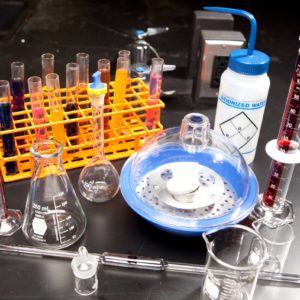Last semester, I hurried out of MOL lab every week to make it to late meal. This past summer, I hurried out of lab at my summer internship to catch my train home. Now I hurry out of orgo lab to finish my reading for precept.
Whether you are working in a lab for your senior thesis or for an intro science class, every period is a race with yourself to complete your work promptly. The key to finishing early is not rushing through your procedure, but rather working efficiently in the lab.
This summer, I worked at a bioengineering lab on campus researching methods to engineer the metabolic pathways of yeast cells to produce large quantities of target biofuels. Normally, yeast cells produce ethanol during fermentation. My goal was to shift the production of ethanol to other biofuels- such as isobutanol- that have a greater potential to be alternative sources of energy. In this post, I will give tips on how to effectively use your lab time by describing a typical day in the lab at my summer internship.
Prepare for Lab Ahead of Time
My day started at 8 am on the train on my way to the lab, where I mapped out the experiments I needed to get done that day. The most important step to working efficiently is to be prepared before coming in. And by this, I do not mean blindly copying down the procedure into your lab notebook before lab. Rewriting a procedure is only useful if you take the time to understand each step as you write it.
Discuss Your Plans With Your Adviser
After arriving at the lab, I discussed my plans for the day with my mentor, Yanfei. He provided feedback and often suggested alternative experiments that were more convenient than what I had planned. To avoid completing unnecessary procedures, always check with your mentor before beginning an experiment.
Minimize Downtime
Upon approval from my mentor, I planned out my time in the lab. Over the summer, I worked from 9 am to 5:30 pm, so I spread out different experiments throughout the day, depending on how long each procedure was including the waiting time within that procedure. To optimize my time in lab, I minimized the time I spent waiting with nothing to do. For example, transformations of plasmids into yeast cells were necessary in my experiment to introduce required genes in the metabolic pathway to produce a specific biofuel. Transformations require two one-hour long waiting periods. I scheduled my lunch break during the first waiting period and began setting up for the next part of the experiment during the second one. Likewise, when I needed to record optical density measurements to quantify the number of bacteria in the cultures, I planned to begin bacterial growth the day before at 5 pm. By 10 am the next day, I could begin taking measurements of my bacterial culture in 2 hour intervals. Taking time to plan out your day helps you manage your time efficiently and complete more tasks during lab.
Prepare Your Materials Before Starting Your Experiments

Once I had my day scheduled, I skimmed through my daily plan again and highlighted chemicals and/or materials necessary for my experiments. I gathered as many of these materials on my lab bench as possible. Having materials ready helped me avoid wasting time searching for chemicals after I started setting up my experiments.
Ask Questions to Other Lab Members
After starting, I often had questions concerning different parts of my experiment. Rather than working on my own, I asked other people in the lab whenever I had any questions. Although figuring things for yourself can help you gain experience with laboratory decision-making and critical thinking, this is often time consuming. If other lab members are available to teach you, ask them for help and for explanations instead. Asking questions will help you complete experiments faster, since you will avoid mistakes due to a lack of knowledge.
—
As you work in the lab, keep in mind that you should never sacrifice quality to save time. It is better to spend an extra few minutes ensuring precision than to risk having to repeat an entire procedure due to low quality results. For instance, it is useless to finish a separation in organic chemistry lab early if your products will be impure and you will need additional purification steps afterwards.
To save time in lab without rushing through your experiments, be prepared before starting any procedure. Understand your goals for that period before coming in, and make sure you and your mentor agree on the experiments you will carry out. If you are stuck on something, remember that other lab members are resourceful and more than willing to help out. Ultimately, as you spend more time in lab, practice will help you complete procedures more rapidly.
–Saira Reyes, Engineering Correspondent

